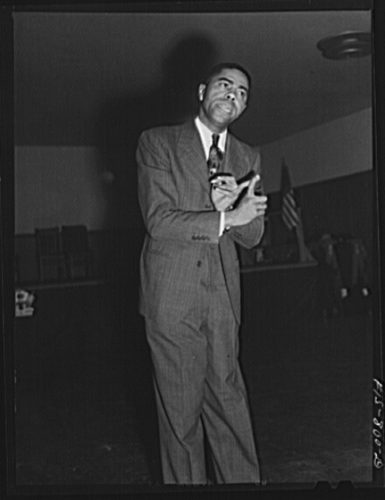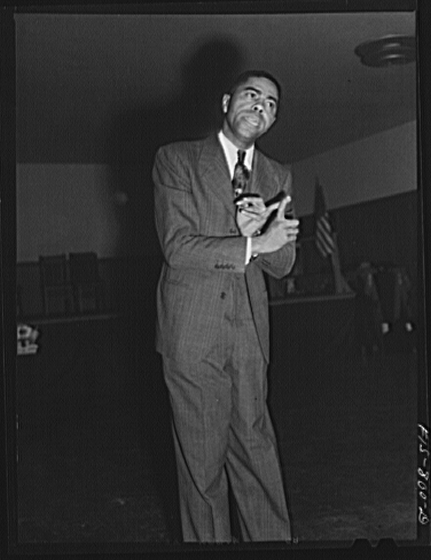
In the days before President Lyndon Baines Johnson, black Republicans were a thing. And chief among them was Samuel B. Fuller. Fuller was a black American entrepreneur in the mid-Century United States. More than just an entrepreneur, he also gave back to the black community by providing both inspirational speeches as well as nuts-and-bolts training at a time when entrepreneurially minded black Americans had precious few options for either. Some entrepreneurs trained or inspired by Fuller include John H. Johnson of Johnson Publishing and George Ellis Johnson of Johnson Products.
To say that Fuller came from “humble beginnings” is a bit of an understatement. He was born into a family of Louisiana sharecroppers who were so poor that he had to drop out of school to work in the sixth grade. But he also displayed an entrepreneurial spirit from a very young age. The young Master Fuller was going door to door selling products at the age of nine.
When he was 15, his family moved to Nashville. It was here that his mother passed away two years later, leaving Fuller in charge of his six siblings. Relief organizations came by to offer assistance, but Fuller turned them down because he didn’t want his neighbors to think his family couldn’t make it without handouts. It was then that he and his siblings made the decision that they were going to make it on their own without any external help.
From Poverty to Multi-Million-Dollar Empire
The road to success was not an easy one for Fuller. He relocated to Chicago where he took a series of backbreaking, menial jobs, before rising up to become the manager of a coal yard. During the Depression, he was working as an insurance agent at the Commonwealth Burial Association, a black-owned firm. Despite having a secure position at that company, he decided to strike out on his own and build his own business.
Using a $25 loan he obtained by using his car as a security deposit (about $375 in 2019 money), he started his own business. With his future wife Lestine Thornton, he purchased a soap load with this money, selling it door to door. He was so successful in this endeavor that he invested another $1,000 in the enterprise. His customer base were largely newly arrived black families on the South Side of Chicago, who had arrived as part of the first Great Migration. This was an underserved community and in them, Fuller saw a potential gold mine. He was promoted to manager at Commonwealth while growing his own business to include a line of 30 products, as well as other salesmen.
In 1939, Fuller opened his own factory. In 1947, he saved his supplier from going under by purchasing it. He used his newly acquired capital to sell everything under the sun, from deodorant to suits. He purchased black newspapers such as the Pittsburgh Courier and the New York Age. In Chicago, his footprint loomed large, especially after he purchased the Chicago Regal Theater and the South Center Department Store.
Fuller was a staunch Republican, albeit a bit of an anachronistic one and with a firm independent streak about him. He was the head of the South Side NAACP and at the height of the Montgomery Bus Boycott, he had a novel and innovative solution: Fuller knew that the bus company was hemorrhaging money due to the boycott and other factors. He proposed winning the boycott by buying the bus line and integrating it. This was part of his entire philosophy about how to end segregation in the South and discrimination in the north: black achievement, not government intervention.
No one is quite sure, but it’s very possible that Fuller was the richest black American throughout the 1950s. His cosmetics company alone was bringing in $18 million annually in 1950 dollars (over $170 million in 2019 dollars). His sales team included over 5,000 members, a third of whom were white. He became the first black man inducted into the National Association of Manufacturers in 1963.
His comment at his induction ceremony that “a lack of understanding of the capitalist system and not racial barriers was keeping blacks from making progress” combined with an interview in U.S. News and World Report where he stated that “Negroes are not discriminated against because of the color of their skin. They are discriminated against because they have not anything to offer that people want to buy” caused some black leaders to call for a boycott of Fuller products. The boycotts were largely unsuccessful, but his reputation was quite tarnished in the black community.
A Legacy of Black Self-Reliance
Indeed, it was his zeal for unregulated capitalism that was ultimately his undoing. In 1968, he was charged with violating the Federal Securities Act after he sold unregistered promissory notes. His company went into bankruptcy in 1971. There was some upward motion after this, but Fuller Products never attained its previous levels of success.
In 1976, Fuller retired due to health problems. In 1988, he died due to kidney failure. His widow estimated that he helped thousands of people to get their start in business.
The legacy of S.B. Fuller is an important one because it is from such a different time in American history, one where the black community was much more ascendant and optimistic. Fuller struck a path that showed that reliance upon both private charity and government fiat was not necessary for the black community to begin achieving parity with their white counterparts. It is unfortunate that the prevailing political winds of the day eschew even the very notion of black achievement.
Though perhaps political prevailing winds and majorities are not important. Fuller would certainly have been familiar with the concept of the “Talented Tenth,” first enumerated by W.E.B. DuBois in his book of the same name. This identifies a leadership class in the black community – approximately 10 percent – who can act as social, economic and political capital lifting up the entire community. Those looking to Fuller as their example for how to build a talented tenth could do no better. He stands firmly in the American tradition of black self-reliance.
Licensed under a Creative Commons Attribution 4.0 International License from Ammo.com.
At Ammo.com, we’re passionate about two things – our customers and our freedom. We are committed to providing excellent service and doing our part in preserving liberties like the Second Amendment. That is why we are known as America’s Pro-Freedom Ammo Source, and that is what sets us apart from the rest (as well as some of the cheapest ammo online).
This article is licensed under a Creative Commons Attribution 4.0 International License. Original can be viewed here. Written by Sam Jacobs

